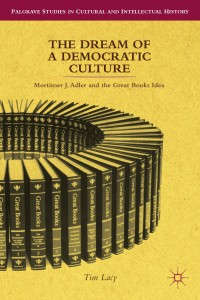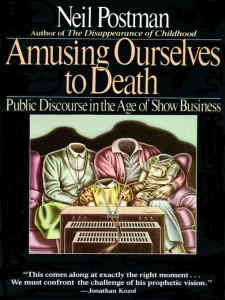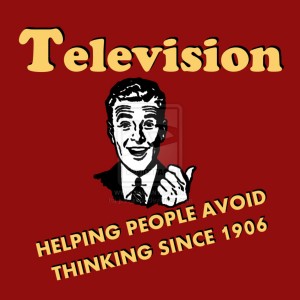 Here’s yet another piece from the book that didn’t make the final round of content cuts. In this Mortimer Adler articulated an embryonic philosophy of television in relation to books, great books, and learning. This selection has only been lightly edited in relation to how it would’ve appeared in the book.
Here’s yet another piece from the book that didn’t make the final round of content cuts. In this Mortimer Adler articulated an embryonic philosophy of television in relation to books, great books, and learning. This selection has only been lightly edited in relation to how it would’ve appeared in the book.
Unlike other posts in this series, I’m glad this was cut. Since finishing the book I’ve been engaged in a closer reading of Adler’s 1937 book Art & Prudence. While Adler disavowed his pre-1950s period for his self-proclaimed elitist tendencies, that book nonetheless offers a subtle argument about the strengths and weaknesses of art (or public art?) in a democratic society. I have sometimes characterized that earlier work as an extended argument for the occasional appropriateness of film censorship. The 1937 book is instead a long reflection on the role of art (i.e. theater, literature, film) in a democracy, with film being an important subtopic. Given my changed view on that earlier work, I would want to put the text below in conversation with that book to develop a longer term view of Adler’s philosophy of public media, entertainment, morals, education, etc. I’m sure I’ll blog about Art & Prudence in the future. In the meantime, this cutting-room-floor piece still has some use as a sign of the times of its production.
Finally, a dedication: This post is for my long-departed, Archie Bunker-like maternal grandfather, Robert P. Sevy (1931-1994), who consistently implored his children and grandchildren to beware of “the boob tube”!
————————————————————-
As the 1970s came to a close, Mortimer J. Adler developed a philosophy about the role of television with regard to reading. He obtained a public opportunity to address the subject in an April 1978 speech given at the Library of Congress. Titled “Books, Television, and Learning,” the talk was delivered at a seminar cosponsored by the LOC’s Center for the Book and the U.S. Office of Education. Of the 41 audience members, notables included: Daniel Boorstin, Librarian of Congress; Ernest L. Boyer, U.S. Commissioner of Education; Frank Stanton, former president of CBS; Robert Sklar, Chairman of the Department of Cinema Studies at New York University; Henry Loomis, President of the Corporation for Public Broadcasting; and Linda Chavez, Director of Communications for the American Federation of Teachers. Adler spoke after Boorstin and Boyer’s opening remarks and just before Frank Stanton. Adler and Stanton delivered keynotes.[1]
Why was this occurring in 1978? The event transcript’s introduction explains the timing as follows:
This collaborative effort between two government agencies had a purpose that runs counter to much of contemporary public comment about television. Books such as The Plug-In Drug by Marie Winn [1977], Remote Control: Television and the Manipulation of American Life by Frank Mankiewicz and Joel Swerdlow [1978], Four Arguments for the Elimination of Television by Jerry Mander [1978], and The Sponsor: Notes on a Modern Poten-tate by Erik Barnouw [1978] have contributed to a general unhappiness about television and its effect on American society and culture. The organizers of the seminar took a more positive view and assumed that television could, should, and eventually would be used effectively in the educational process.[2]
For his part, Adler sought to answer three questions: (1) “What is the place of the book in a television society?” (2) “What special qualities of the book ensure its central role in the learning process?” (3) “How has television—the hours we spend with it and its content—affected our relations [with] books, with schooling and with learning?” Note the irony of Adler, the most prominent advocate since the 1930s for reading great books, being asked, potentially anyway, to think positively about learning through television instead of books.
It did not take long for Adler to get to the heart of the issue—meaning why he was invited and given a prominent speaking role. In evaluating assumptions behind these questions, especially question two, Adler asked whether books, “at their very best,” are actually any better than television? Adler believed “that TV at its best is about as good as [normal] books at their very best” in two ways: as entertainment, and as “conveyor[s] of information.” But, with regard to “improving the mind by enlightening it, by activating the thinking process, by awakening ideas in it, [and] by elevating it from understanding less to understanding more,” books functioned incomparably better than television. Then he invoked, indirectly, the great books idea—and even an indirect allusion to How to Read a Book. “Some books,” he added, meaning “the best books, can perform [these] function[s] for those who have learned how to read,” whereas “television cannot perform” in this way—“at all.”[3] Learning through television had its uses, but the highest learning comes through the great books.
Adler then reaffirmed the thesis of a 1941 essay, authored him, titled “Invitation to the Pain of Learning.” Therein, and for his 1978 audience (the essay was copied and distributed to conference attendees), he argued that even most educational programs are “shams and delusions” because “they confuse education and entertainment.” They also “suppose that learning can be accomplished without pain.” Television, he said, hurts all people who lack both the energy and the powers of concentration to focus on reading. He lamented the development of “a habit of passive reception” in relation to all media—to “sitting back and letting the bewitching images on the screen wash over one.” He also disparaged merely “turning the pages” of a book for its lazy passivity. For Adler, activity must always trump the passiveness that might turn into dangerous ignorance.[4] Indeed, by extension it seems clear that when Adler appeared on television, as he did many times during the 1970s and 1980s, his belief and best hope—no matter the interviewer—was to be entertaining and convey information. Genuine learning occurred in other, more interactive spheres.
 Unlike some past and recent critics, Adler did not speak broadly about television or film being the cause of anti-intellectualism. He wrote his address in age where “screen time” (to put it in today’s terminology) was both less user-directed (i.e. internet) and less interactive (i.e. social media), and before the age of 24-hour political news on cable. But Adler refused to make television the scapegoat. Consumers were also a problem, not just producers. Contrast this with a work on recent American anti-intellectualism by Susan Jacoby, wherein she declared her complete solidarity with Neil Postman, who wrote in Amusing Ourselves to Death (1985) that “television is at its most trivial and, therefore, most dangerous when its aspirations are high, when it presents itself as a carrier of important cultural conversations.” Jacoby went on to blame television for the “corruption of middlebrow aspirations.”[5] To his credit, Adler reminded his audience that “most” books are not good, just like television. Returning to consumers, Adler also argued that schooling and adult education were at their “lowest ebb” in the late 1970s. This complicated considerations of television’s positive and negative effects.
Unlike some past and recent critics, Adler did not speak broadly about television or film being the cause of anti-intellectualism. He wrote his address in age where “screen time” (to put it in today’s terminology) was both less user-directed (i.e. internet) and less interactive (i.e. social media), and before the age of 24-hour political news on cable. But Adler refused to make television the scapegoat. Consumers were also a problem, not just producers. Contrast this with a work on recent American anti-intellectualism by Susan Jacoby, wherein she declared her complete solidarity with Neil Postman, who wrote in Amusing Ourselves to Death (1985) that “television is at its most trivial and, therefore, most dangerous when its aspirations are high, when it presents itself as a carrier of important cultural conversations.” Jacoby went on to blame television for the “corruption of middlebrow aspirations.”[5] To his credit, Adler reminded his audience that “most” books are not good, just like television. Returning to consumers, Adler also argued that schooling and adult education were at their “lowest ebb” in the late 1970s. This complicated considerations of television’s positive and negative effects.
To provide a set of ideals for television as an education medium Adler used this opportunity to advocate for a particular vision of “schooling and the learning process.” For starters, he rejected all forms of “elitism” in education, whether in the medium of books or television. What followed previewed, in many ways, planks of the Paideia Proposal that appeared a few years later: “equal educational opportunity for…all without exception,” “liberal schooling for all, without any trace of vocational training,” the need to begin schooling “at age four and terminate at age sixteen with the B.A. degree,” and, finally, the liberal arts defined as “the arts of learning—the skills of reading, writing, speaking, listening, observing, measuring and calculating.” Adler concluded this section of his keynote by returning to his ideal teacher, Socrates. Socrates put on display the notion that “learning does not consist in the passive reception of content.” Television teaches by “telling” rather than “asking,” and the latter “demands intellectual activity rather than memorization or regurgitation.” Again, activity trumped passivity. In tying the conversation more tightly to books and television, Adler emphasized that he was not “saying that most books are good and most television bad,” but rather that “very few books” published in any one year (say 100 of the 35-40,000 published) served as solid objects for the process of active learning. Books and television, again, were about equal in terms of entertainment and information conveyance. But the best books, which were an admitted minority, far outpaced the best television programs for enlightenment.[6]
————————————————————-
Notes
[1] UCSC/MJAP, Box 131, folder: “Books, Television, and Learning” (transcript, p. 1). Transcripts of the event, which occurred April 26-28, 1978, were published by the Library of Congress, and copies are available in over 300 libraries—and online.
[2] John Y. Cole, ed., Television, The Book, and The Classroom (Washington: The Library, 1978), 1.
[3] Adler speech copy, pp. 1, 2, 6-11, 13; Adler, “A Philosopher’s View of Television,” 17. Even today’s public intellectuals have a troubled relationship with television. For more on this see The Public Intellectual, Helen Small, ed. (Malden, MA: Blackwell Publishing, 2002) and Richard Posner’s Public Intellectuals: A Study of Decline (Cambridge: Harvard University Press, 2001).
[4] Ibid.
[5] Susan Jacoby, The Age of American Unreason (NY: Random House, 2008), 13-14, 124-125; Neil Postman, Amusing Ourselves to Death: Public Discourse in the Age of Show Business, Introduction by Andrew Postman (NY: Viking Penguin, 1985; reprint, NY: Penguin, 2006), 16. If you agree with Jacoby and the Television-Helping-People-Avoid-Thinking-Since-1906 meme above, then this essay by Ron Kaufman will be up your alley.
[6] Adler speech copy, 3-8.


5 Thoughts on this Post
S-USIH Comment Policy
We ask that those who participate in the discussions generated in the Comments section do so with the same decorum as they would in any other academic setting or context. Since the USIH bloggers write under our real names, we would prefer that our commenters also identify themselves by their real name. As our primary goal is to stimulate and engage in fruitful and productive discussion, ad hominem attacks (personal or professional), unnecessary insults, and/or mean-spiritedness have no place in the USIH Blog’s Comments section. Therefore, we reserve the right to remove any comments that contain any of the above and/or are not intended to further the discussion of the topic of the post. We welcome suggestions for corrections to any of our posts. As the official blog of the Society of US Intellectual History, we hope to foster a diverse community of scholars and readers who engage with one another in discussions of US intellectual history, broadly understood.
Tim, dedicating this post to your granddad is very sweet. I’m trying to recall whether or not any of my people called TV “the boob tube,” but I don’t believe so — the connotations of “boob”/”boobie” as relating to cognitive impairment of some kind would have been overshadowed by the terms’ bosomy valences.
Anyway, the whole post reminds me of a cult classic now celebrating its 40th anniversary. No, I’m not talking about Blazing Saddles, also celebrating 40 years of greatness. I’m talking about The Groove Tube. Here’s the film’s wikipedia page, and here’s its IMDB page. It’s an interesting contemporary commentary on 1970s TV.
(I would post a YouTube clip from the film here in the comments, but I’ll let you all google those for yourselves. I think I’ve done enough damage as it is with “bosomy valences.”)
I added *The Groove Tube* to my Netflix queue. Now I’ll look up those clips. I’m always game for 1970s era Chevy Chase—esp. since the time frame corresponds. – TL
Oh mercy. But since the damage is done…while you’re at it, you might want to add Kentucky Fried Movie (1977) to your queue. It’s a sketch-comedy satire of various film genres, film scenarios, and film-related fads/trends. Here’s the wikipedia page.
Again, I won’t be posting any clips. Take to the googles and see what you find. Some of the sketches are definitely more memorable than others. But the film as a whole is part of this same moment/genre of 70s media self-parody — so it might be worth watching for purely historical reasons.
I’ve seen bits (or all) of Kentucky Fried Movie—though it’s been years since the screening.
But, in relation to TV and 1970s laments by intellectuals, these are movies. I suppose the “vast wasteland” that was 1970s television is shown by the exceptions: Roots, Sesame Stree, Firing Line, etc.
FYI/FWIW: CSpan’s Booknotes, the forerunner to BookTV, did not begin until 1989, if Wikipedia is to be believed. – TL
Can’t help but note the coincidence of this post coming a day or so before Reading Rainbow launched its Kickstarter campaign.